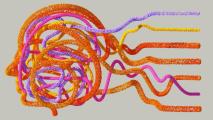
Biotech
Human history has been all but defined by death and disease, plague and pandemic. Advancements in 20th century medicine changed all of that. Now advancements in 21st century medicine promise to go even further. Could we bring about an end to disease? Reverse aging? Give hearing to the deaf and sight to the blind? The answer may be yes. And soon.
More
There is now a blood test for anxiety disorders
A new blood test for anxiety may be able to help doctors diagnose patients and find effective treatments for them more quickly.
Large language models are biased. Can logic help save them?
MIT researchers trained logic-aware language models to reduce harmful stereotypes like gender and racial biases.
As bird flu spreads in the US and worldwide, what’s the risk that it could start a human pandemic?
Many virologists are concerned that the latest bird flu outbreak could spill over to humans and cause a new human pandemic.
This easy fix could eliminate harmful chemical exhaust from home heaters
Retrofitting gas heaters with this catalyst could slash their environmental impact.
First ever therapy for rare genetic disorder now approved
The FDA has approved the first drug for Rett syndrome, a genetic neurodevelopmental disorder, which disproportionately affects women and girls.
AI isn’t close to becoming sentient, we just think it is
To what extent will our psychological vulnerabilities shape our interactions with emerging technologies? AI will be the test.
Making electricity from wastewater
Researchers have developed a “sandwich-like” membrane that removes pollutants while generating power.
Pfizer’s nasal spray for migraines is heading to pharmacies
The FDA has approved Pfizer’s zavegepant, a nasal spray for migraines that can ease pain in as few as 15 minutes.
Psychedelics open a new window on the mechanisms of perception
Some neuroscientists think psychedelics and the hallucinations they induce could help reveal how we generate our perceptions of the world.
First healthy mice with two dads — and no moms — born in Japan
For the first time, scientists have created healthy, fertile mouse pups using only the DNA of two adult males.
Here’s how your sleep affects your immune system
Researchers found that patients who slept less than six hours a night were 27% more likely to have an infection.
Canadian students discover EpiPens will turn toxic in space
Canadian students launched EpiPen solution into suborbital space, and what came back was no longer life-saving medicine.
A single injection of stem cells slashes risk of heart attack or stroke by 58%
An injection of stem cells reduced the risk of heart attack or stroke by 58% in a trial of people with heart failure.
Does online opioid treatment work?
A sudden shift to virtual health care has increased access — and possibly outcomes — for patients with opioid use disorder.
“Zombie virus” revived after 48,500 years in permafrost
A newly discovered “zombie virus” was still able to infect hosts more than 48,500 years after it was trapped in Siberian permafrost.
Volunteers were purposefully infected with COVID-19. Was it worth it?
It has been a year since the first COVID human challenge data was published. What did we learn, and can HCTs prepare us for the future?
“Digital detoxes” don’t work. Try these 4 skills instead
Digital distractions have become a ubiquitous part of work and life. But these distractions begin with emotional discomfort.
Watch: Scientists breed flame-resistant cotton, without added chemicals
USDA researchers have developed self-extinguishing cotton lines, potentially cutting down on the need for flame retardants in the future.
New drug could extend lives of people with deadly bone cancer
A new drug might extend the lives of people with bone cancer without subjecting them to painful or unpleasant treatments.
Scientists inject stem cells into the brain of Parkinson’s patient
A new stem cell therapy for Parkinson’s disease has just been administered to the brain of a person for the first time.
Subscribe to the newsletter































